Summary
Following international trends, currently, in Mexico, according to the Encuesta Nacional de Ocupación y Empleo (ENOE)1 of women older than 15 years old, only 42 percent are employed compared with 75 percent of men of the same age. In 2016, ProSociedad offered to develop a proposal to train and articulate social organizations and the public sector already involved, directly or indirectly, with the purpose of the economic empowerment of women. Co-Meta was formed in the framework of a macro project called Jalisco Sin Hambre (Jalisco without hunger) and financed by CONACYT and the Secretary of Innovation, Cience and Technology of Mexico with the leadership of ITESO, the Tecnológico de Monterrey, among other academic institutions.
Article
Following international trends, currently in Mexico, according to the National Survey of Occupation and Employment, of women who are more than 15 years old only 42 percent are employed compared with 75 percent of men of the same age. In the case of Jalisco, the situation does not differ significantly from the national statistics, given that the same survey confirms that the rate of economic participation of men is of 78.4 percent, while the rate for women is only 45.4 percent, meaning that in this region the economic participation inequality gender gap is 33 percent.
Women participate a lot less than men in the economic sphere, and women who do participate also face income inequality. This is a factor that affects all women, regardless of their income level. On a national level, 41 percent of employed men had an income that amounts to two times the minimum wage, while only 28 percent of employed women received an equal sum. In Jalisco, on the other hand, 53 percent of working women receive two times the minimum wage or less, while only 27 percent of working men in the state are in that situation (INEGI, 2018).
Low labor participation, salary inequality, and other manifestations of the economic inequalities between women and men in a state and country level, are the reflection of the multiple barriers that limit the full personal, professional, and social development of women. These inequities derive in several problems that not only affect women, violating their human rights, but also impact the society as a whole. On an individual level, the low economic empowerment of women promotes their dependence towards their partner or spouse, as well as other members of their family, which has been proven to increase their risk for domestic violence. At a societal level, low economic empowerment of women contributes to the prevalence of the transgenerational poverty cycle and the reproduction of stereotyped gender roles that exclude women from the workforce and economic decision-making, sustaining gender division of labor, the prevalence of the feminization of professions, and the undervaluation of the contribution of women to the labor sphere.
On the other hand, expanding economic opportunities for women could benefit them individually, but there is a greater need to also expand macroeconomic activity. Several studies have proven that the economic empowerment of women derives in more investment in their children, poverty reduction, and an augmentation of life aspirations for the next generations (Buvinic et al., 2013 y Ortmann, 2015). Regarding the macroeconomic impact of the economic empowerment of women, some estimates indicate that raising the levels of employability of women costs a GDP of around five percent for countries (Buvinic et al., 2013).
Nevertheless, the barriers that women face to exercise their rights to economic participation have a complex and historic background. Many of them are structural, such as stereotypes, gender roles, beliefs, and values associated with gender. Although, there are also direct causes for this, such as the low labor expectation of women, the unequal division of unpaid caretaking work, low technical skills, few support networks, and financial exclusion. It should be noted that these barriers become higher for low-income women and those with lower education levels. For example, according to the ENOE (INEGI, 2019), in Mexico the average trimestral income of women is lower depending on their education level. In addition to that, it has been demonstrated that education gives people the ability to access better socioeconomic conditions, which many women lack and therefore have no second-chance opportunities to obtain them.
Nonetheless, Mexican women are active. They work and produce value for their families and communities. The inclusion of women in the economic and social sphere is necessary and represents a great opportunity to mitigate the inequalities that they face. It is not only a state obligation to guarantee women’s human rights, it also serves well their families and communities. Still, to achieve this it is fundamental to promote alternate economic models that have inclusive and sustainable perspectives, as well as harnessing local communities’ resources and women’s talents.
Experience and Opportunities to Promote Economic Inclusion of Women in Jalisco

Motivated by this problem and recognizing the existing potential to generate positive impact in Jalisco, ProSociedad2, in collaboration with the Guadalajara Food Bank, has for a decade been developing several projects of action research oriented towards the promotion of the economic empowerment of women who participate in the programs managed by the food banks. These experiences have included personal development training projects, as well as other initiatives focused on entrepreneurship, formal education, and productive projects.
From these experiences on one hand, it was proven that low income women who participate in social and food assistance programs -- in this case, within the Food Banks -- are motivated and eager to acquire new skills for employment or entrepreneurship, and that, if given access to opportunities for their economic inclusion, the majority of them find ways to overcome the barriers related to it, for example, finding the necessary time to participate in training sessions.
On the other hand, these initiatives -- which have propelled forward in different scenarios in the state of Jalisco -- as well as other research efforts done by ProSociedad, have led to the conclusion that it is necessary that programs aiming at promoting women’s economic empowerment should have a holistic approach. This means, first of all, that they should aim to strengthen the capacities of women through education and accompaniment opportunities in the areas of personal development, technical abilities, entrepreneurship skills, and financial education. Second of all, they should also aim to facilitate women’s access to markets, value chains, and financial services to invest and accumulate assets. All of this must be constructed by placing at the center the needs and interests of women, focusing the services to the attention of the barriers women face, and the potential that can develop from each of them. At the same time, it is fundamental that programs that seek to include women in the economic sphere have a sufficient duration, which, regularly, at least amounts to two or three years. In addition to that, processes must be monitored and adjusted to be able to reach the development milestones and ensure women’s agency is assured.
Today in Mexico and in the state of Jalisco, several local and regional efforts are being promoted by both public and private organizations aiming to enhance women’s empowerment. However, these initiatives tend to be implemented in isolation, with partial solutions, without monitoring and evaluation mechanisms, and in a lot of cases, without a gender perspective, leaving them on a low scale and without effective ways of proving their results nor learning from them. This results in low probabilities to generate a sustained and scalable impact for women. Nevertheless, we recognize that there are actors with will, infrastructure, and resources trying to solve the problems associated with the economic inequality that Mexican women face. With appropriate capacity building and systemic articulation, they can all collectively have the power to change women’s conditions.
As a result of extensive research on women empowerment models worldwide, ProSociedad identified a relevant experience Targeting the Ultra-poor (TUP) also called graduation program developed by BRAC, an international NGO based in Bangladesh in the 1970s. The graduation program, has a holistic approach to promote women living in extreme poverty, developing capabilities and community linkages to tackle their social and economic exclusion. The graduation model combines technical, human, financial, and productive capacity-building, economic assistance (both in consumption and in the form of seed capital), as well as the linking and strengthening of social and economic support networks.
There is solid evidence on the effectiveness of the graduation program (Banerjee, A. et.al, 2015) to increase women’s income, asset accumulation, and food security, as well achieving family and community participation. Some important indicators of the success of the graduation model are for example, that after four years of completion of the program, the women who participated in it achieve an income 37 percent higher and work 25 percent more days than women in the control group, and their access to housing after seven years is two times higher than that of the control group (Bandiera, O. et.al., 2015). Due to its success the model has been replicated and adapted in 43 countries reaching 14 million people (Arevalo, I. et.al, 2018).
Co-Meta: A Collective Impact Initiative for the Economic Empowerment of Women
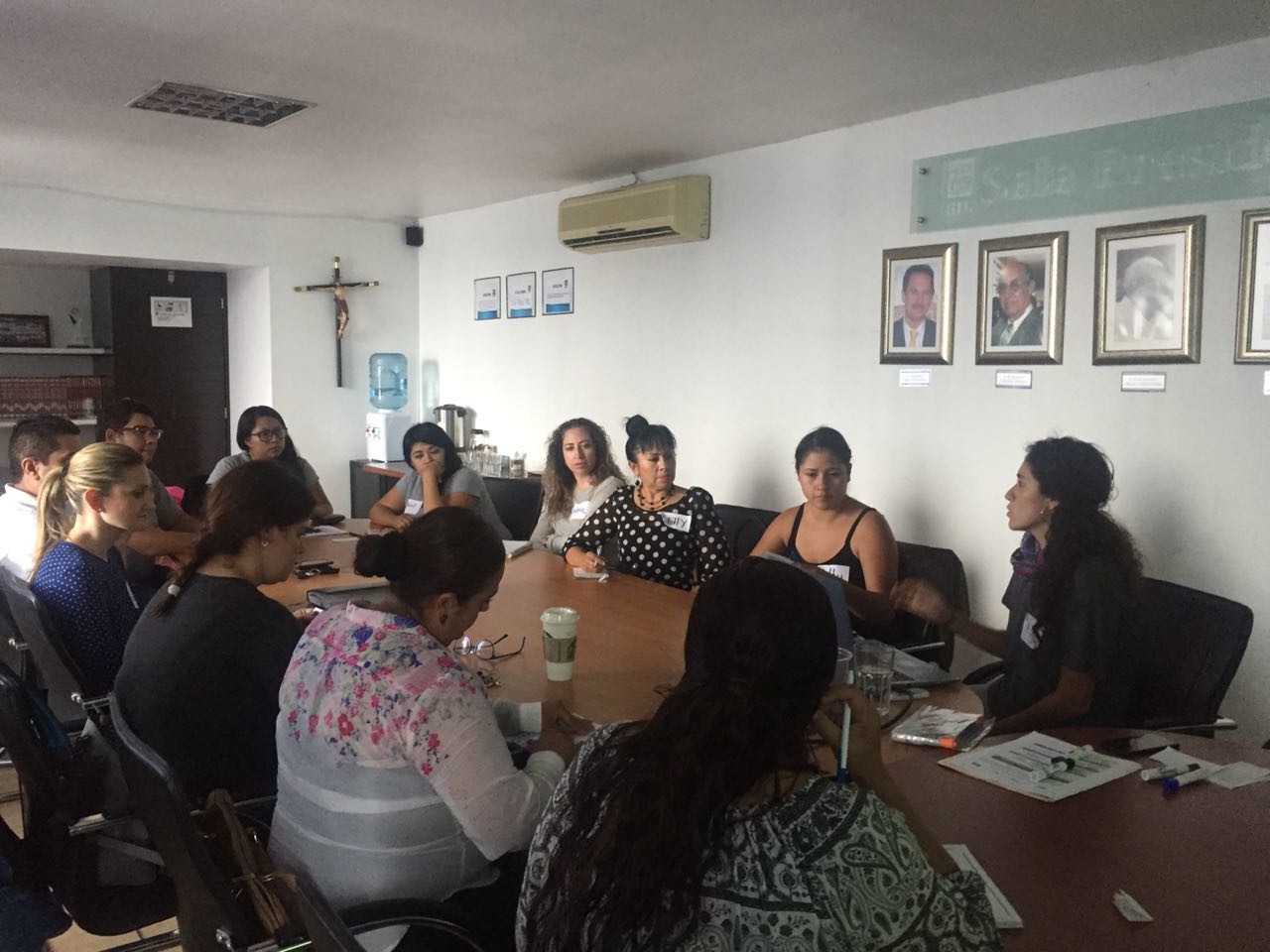
Staff and leaders of implementing partners participating in the initial training to adopt good practices to implement Co-meta program
Photo Credit: ProSociedad, 2018
With this practical and theoretical background, in 2016 ProSociedad launched the Co-Meta initiative in order to design and adapt a graduation program that worked for the local context and the needs of urban women in the Metropolitan Area of Guadalajara. The purpose of Co-meta is increasing the impact of economic empowerment programs and evidence-based policy in Mexico, by promoting graduation model good practices and promoting collective impact initiatives to achieve greater reach and impact. It is important to say that this effort was supported by the project “Jalisco Without Hunger” led by local universities ITESO and the Tecnológico de Monterrey (TEC) and financed by the National Council of Science and Technology (CONACYT) and the Ministry of Innovation, Science and Technology.
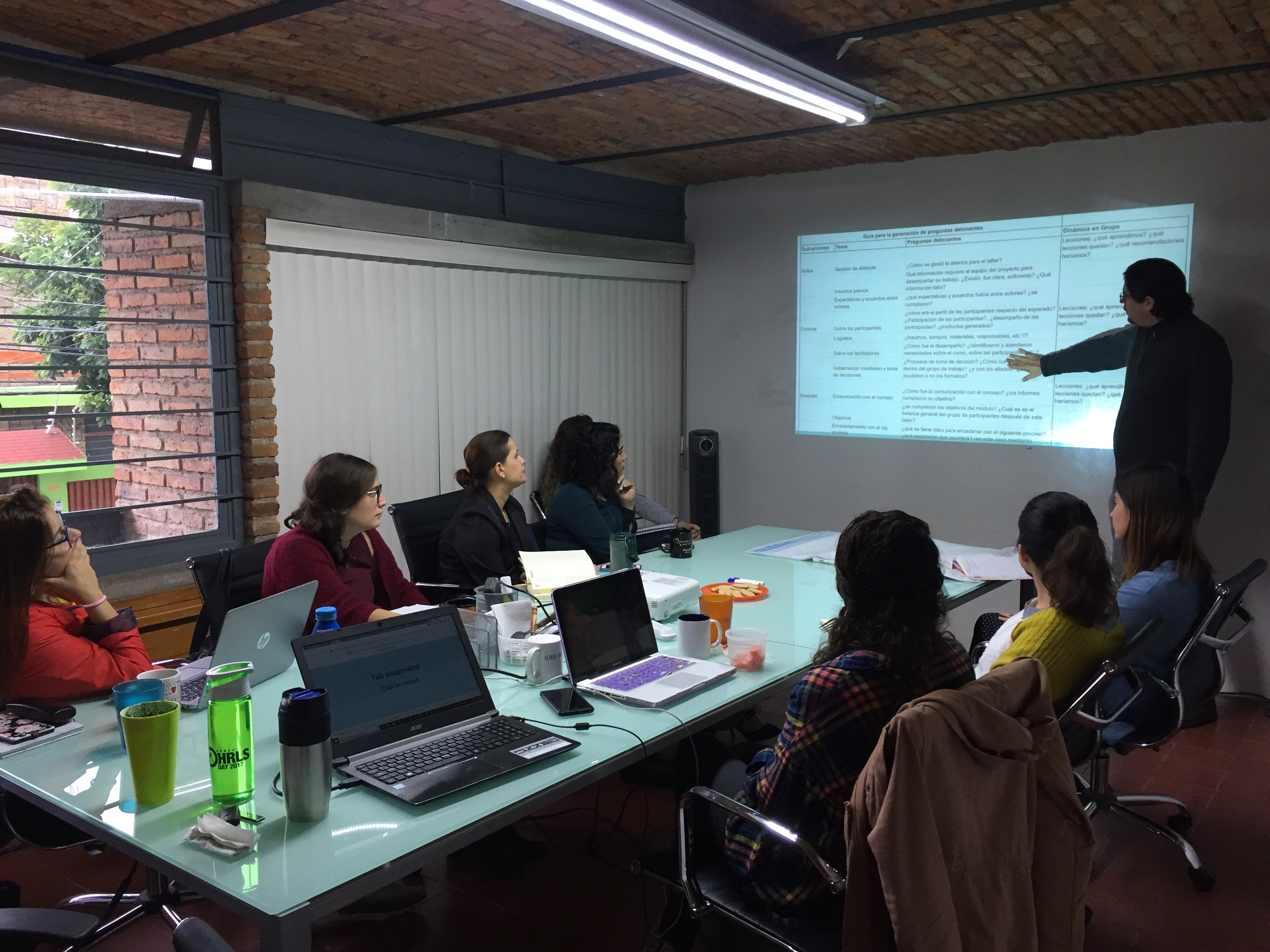
Staff and leaders of implementing partners and allies participating in a learning session as part of their training to improve their services for Co-meta women’s economic empowerment program
Credit: ProSociedad, 2018
To achieve this challenge, ProSociedad proposed the development of a capacity-building and collective impact initiative that involved social and public sector organizations that were already impacting women economic empowerment. This approach to the challenge was not only more efficient, but also more sustainable, as local actors were committed to collaborating even after the project ended. As the backbone organization, ProSociedad designed and implemented a training program for local partners, specifically made for staff and directors of community-based NGOs, government agencies, and companies. This program aimed to strengthen skills to adopt the best practices of the graduation programs, as well as build collaborative leadership among them. As a product of this training, partners would able to make significant changes in the way they provide their entrepreneurship services given to women of low-income background for them to achieve greater economic empowerment.
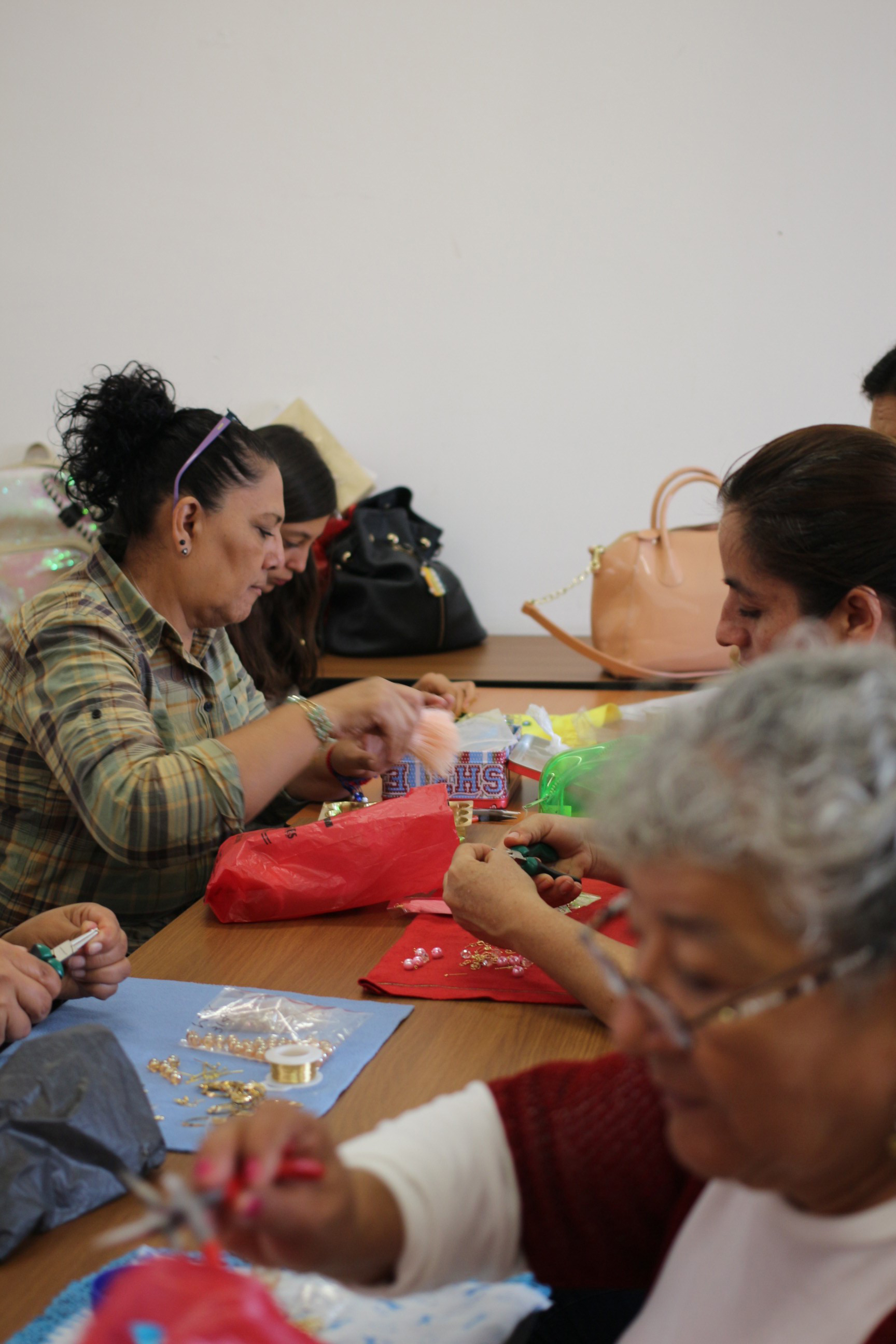
Co-meta’s participant women in their technical skills training to learn “Artisanal jewelry”
Credit: ProSociedad, 2018
The capacity building program for partner organizations of Co-Meta has two phases: the intensive phase described above with a duration of 12 months, and the follow-up phase, which intends to be permanent through the establishment of a Learning Community that today is still in the initial stages. The formative approach is based in organizational development and social innovation theories, and includes theoretical and practical tools, as well as on-the-job training. Although there is a generic curriculum, ProSociedad also adopts the training program based on an organizational diagnosis, as well as a community and local economy study, which allows for the adaptation of methodology to the conditions, needs, and opportunities of partners and the context to promote women’s empowerment. Articulation of partners with other local and financing actors in order to sustain the program is also part of ProSociedad’s roles.
Co-meta’s Results and Social Impact
So far Co-Meta has supported two non-governmental organizations, Guadalajara Food Bank and Asociación Femenina ProMéxico; as well as several companies, like CEMEX, Hewlett Packard, and a local social enterprise En Concreto. Universities have taken part in the program too, such as ITESO and Tec de Monterrey; as well as local governments, like the Municipal Government of Zapopan and the Government of Jalisco. Currently, the program has mobilized more than five million pesos to serve 135 women in the city of Guadalajara, and it is expecting to scale to 250 women by the end of this year when it will be operational in two new community centers in the municipalities of Zapopan and Jocotepec.
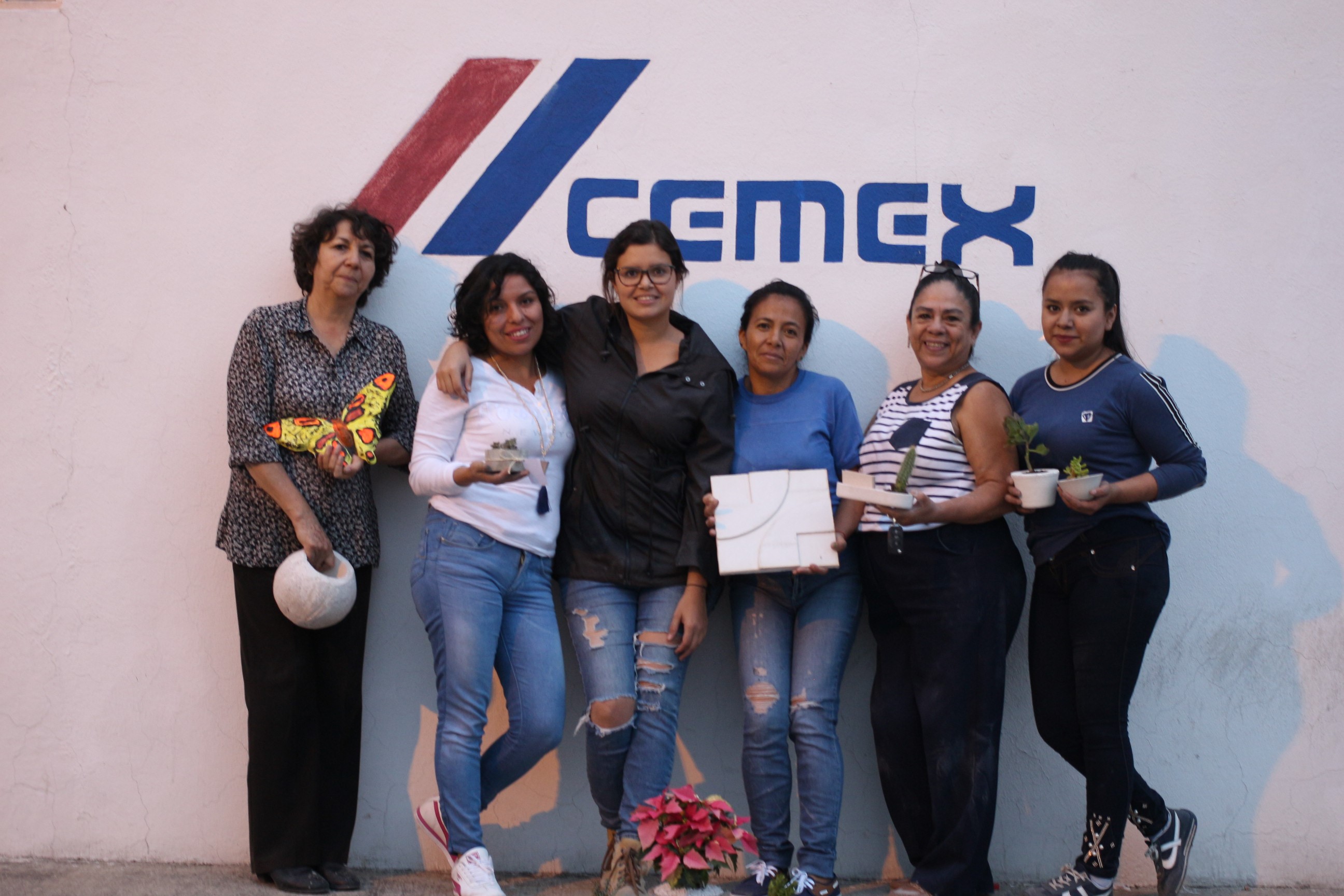
Co-meta’s participant women and the leader of the implementing partner En Concreto celebrating and showing their first product prototype of the technical skills training for “Artisanal concrete products”.
Credit: ProSociedad, 2018
Co-Meta has also promoted important changes in the lives of the women. In the mid-term evaluation of the participants of the Miravalle Co-Meta Center, some of the main results observed in terms of attitude and behavior changes of the women, have been the following:
- Currently, there are 79 active women, with a 72 percent rate of prevalence since the start of the program (August 2018);
- Women are investing around $160-$600 Mexican pesos monthly in their own businesses;
- 65 percent of participants report that their economic situation has improved somewhat or significantly; and
- An average increase of 6.4 percent in payed work hours.
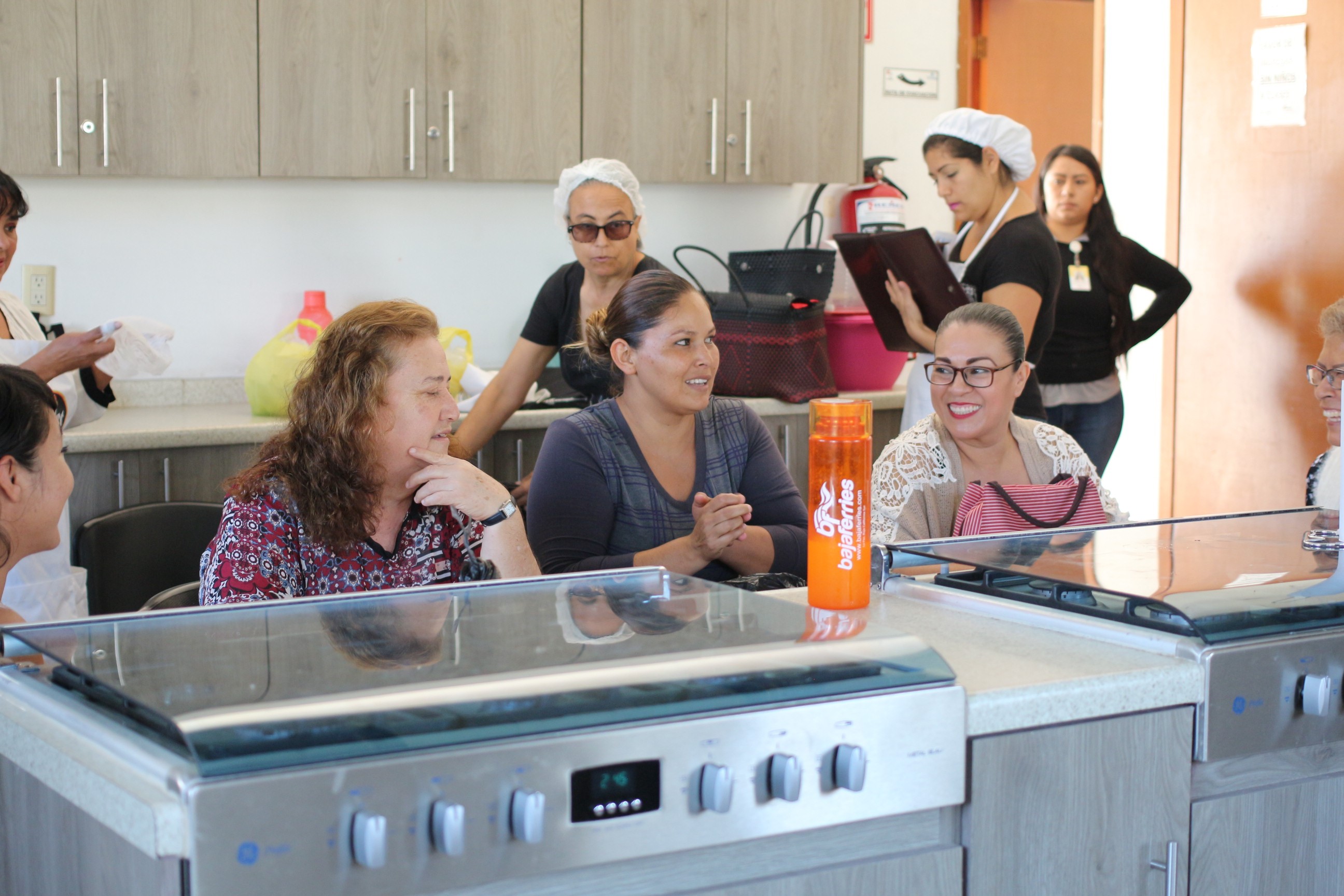
Co-meta’s participant women in their technical skills training to learn “Pastries and Bakery products”
Credit: ProSociedad, 2018
Future Vision of Co-Meta
In the future, Co-Meta aims to grow into a wide network of Changemakers united in the common objective of propelling the economic empowerment of women in Mexico. To achieve it, ProSociedad, as a backbone organization, has begun a process for the creation of a Co-meta Learning Community that serves as a platform for the exchange of experiences and collaborative work around innovative methodologies for the promotion of the economic participation of women. The Co-meta Learning Community will be launched in the following months with the first annual meeting of Co-meta partners and allies, in which a participatory diagnosis will be constructed around the state of the problem of economic inequality between men and women in the region, as well as the analysis of the needs and action opportunities of the private and public sector actors that tend to this problem.
As a result of this event it is expected that relevant actors around the women empowerment sector will build a common agenda to determine a set of milestones in order to build and strengthen the ecosystem and scale their impact. In addition, ProSociedad will continue offering capacity-building programs and promoting the exchange of knowledge among its members. Finally, Co-meta will promote initiatives to impact public policy and to mobilize resources at a national and international level to scale impact in favor of the economic empowerment of women. In doing so, Co-meta will strive to give a wider protection and sustainability to our joint efforts to combat the structural and gender barriers that affect, nowadays, the full exercise of human rights of women, especially their right to sustainable economic inclusion.
Footnotes
1 INEGI, ENOE fourth trimester 2018
2 ProSociedad is a development agency that aids those who want to aid. For that, we promote training, accompaniment and applied investigation programs oriented towards the incrementation of the impact and reach es of organizations that have social objectives: non-governmental organizations, foundations, governments, public institutions and social enterprises. Through those strategies, we contribute to several goals of sustainable development, such as the economic empowerment of women, education and early child development, violence prevention and youth employment.
Works Cited
Arévalo, Ines; Kaffenberger, Michelle; de Montesquiou, Aude. (2018) State of the Sector. Synthesis Report. Partnership for Economic Inclusion. November 2018. Available in www.findevgateway.org/sites/default/
Bandiera, Oriana; Burgess, Robin; Das, Narayan; Gulescid, Selim; Rasule, Imran; and Sulaimanf, Munshi. Can basic entrepreneurship transform the economic lives of the poor? Working paper. International Growth Group (ICG). Available in www.theigc.org/wp-content/uploads/
Banerjee, A., Duflo, E., Goldberg, N., Karlan, D., Osei, R., Parienté, W., ... and Udry, C. (2015). A multifaceted program causes lasting progress for the very poor: Evidence from six countries. Science, 348(6236), 1260799.
Buvinic, M., Furst-Nichols, R., y Pryor, E. C. (2013). A Roadmap for Promoting Women’s Economic Empowerment. United Nations Foundation and ExxonMobil Foundation.
Conger, R., Conger, K. andy Martin, M. (2010). Socioeconomic status, Family Processes, and Individual Development. Journal of Marriage and Family, 72(3), 685-704. Available in Disponible en: onlinelibrary.wiley.com/doi/abs/
INEGI, ENOE fourth trimester 2018.
INEGI, ENOE first trimester 2019.
Martin, M., Conger, R., Schofield, T., Dogan, S., Widaman, K., Donnellan, B. and Neppl, T. (2010). Evaluation of the interactionist model of socioeconomic status and problem behavior: A developmental cascade across generations. Development and Psychopathology, 22, 695-713. Available in www.cambridge.org/core/journals/
McElwee, G. andy Al‐Riyami, R. (2003). Women entrepreneurs in Oman: some barriers to success. Career Development International, 8(7), 339-346. Available in www.emeraldinsight.com/doi/ref/
OECDCDE (2015). Skills for Social Progress: The Power of Social and Emotional Skills. Paris: OECD Publishing
Ortmann, A. (2015). World Development Report 2015: Overview: Mind, Society, and Behavior. A World Bank Group Flagship Report. Available in openknowledge.worldbank.org/
Author bio
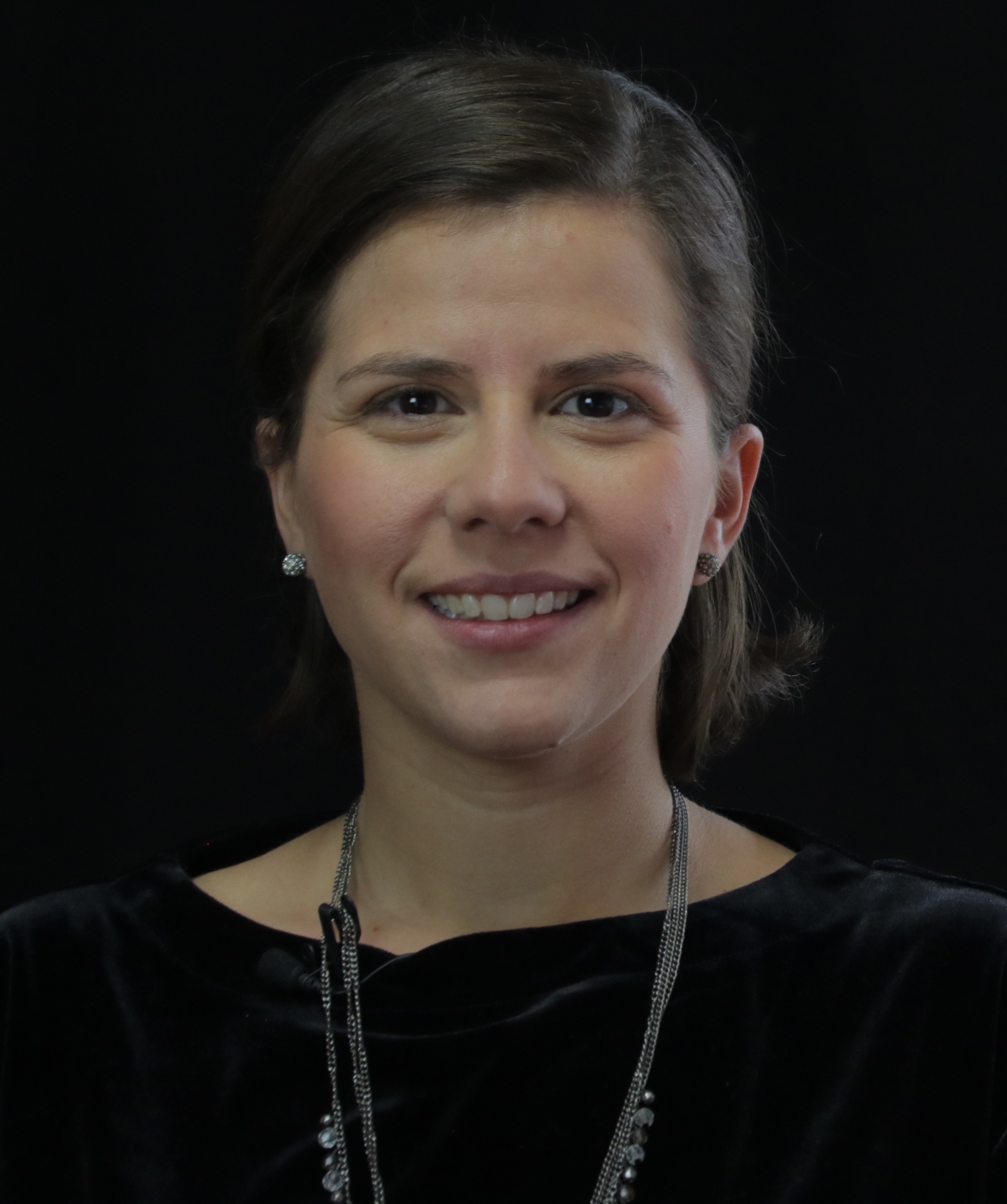
Magdalena Rodríguez has a master’s degree in development management from the London School of Economics and Political Science (LSE) and is an Industrial and Systems Engineer from the Tecnológico de Monterrey Campus Guadalajara. She is the founder and co-director of ProSociedad, Agency for the development of projects on social impact.
In 2018 she was selected to represent Mexico in the Program of Leadership of International Visitors and invited by the United States to share best practices in Corporate Social Responsibility.


